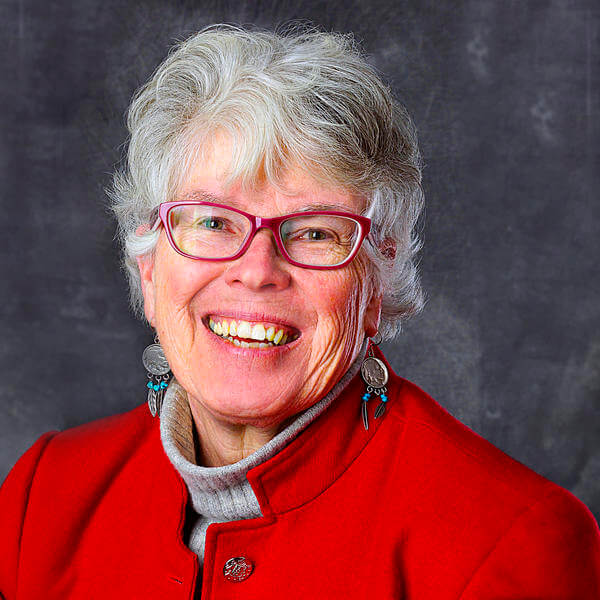Thanks to her acute sense of justice and purpose, a sharp, analytical mind, and tremendous kindness, friends and former colleagues say Alice Laffey was the conscience of the religious studies department during her 35-year Holy Cross teaching career and through her retirement, until her recent death at 78 after a brief illness.
“Rabbi Abraham Joshua Heschel once described prophets as living ‘an octave too high for most of us,’” said Mahri Leonard-Fleckman, associate professor of religious studies. “This is the heart of Alice. She was an incredibly complicated woman; larger than life. Her sense of injustice was so profound and never rested, and she lived a life of immense integrity because of that.”
A scholar of the Hebrew bible and one of the first to bring a feminist theology to Holy Cross, Laffey held licentiate and a doctoral degree in sacred scripture from the Pontifical Biblical Institute of Rome, the first woman to do so. Her academic scholarship reflected not only her areas of expertise but of interest, focusing on the Hebrew bible (the Old Testament), feminist hermeneutics, and ecology and the Bible.
“She was thoughtful and caring, always sharing, be it through lively conversations, dinner invitations to her home or with some small yet pertinent gift she thought might be helpful to you or you would find fun,” said Ann Flynn, a lifelong friend, psychologist and former director of College counseling. “Alice constantly was thinking of the other and noticed what you might need or enjoy, and then acted on that.”
Being the conscience of a department and an outspoken voice of justice made things rocky at times on a college campus. Known for her “usually appropriate, but often very pointed way,” Laffey made sure that what she saw as an injustice was addressed, according to Rev. William Reiser, S.J., professor of religious studies. “Alice was a good friend, consummately honest and loyal,” he said.
“She made sure it wouldn’t be forgotten or brushed off,” said Alan Avery-Peck, the Kraft-Hiatt Professor in Judaic Studies and professor of religious studies. Laffey would make an appointment with the College president to discuss an issue rather than just mutter about it under her breath or vent with colleagues, Avery-Peck noted.
“Alice was intense. Her manner was low key and deferential — she showed her availability to people, her generosity, kindness and concern — but it covered a strong intensity about what she believed in. If she thought a student or faculty member was being mistreated, she would address it directly,” said Rev. Michael C. McFarland, S.J., the 31st president of Holy Cross.
Leonard-Fleckman said Laffey’s role in her department, at the College and in society was needed and not something that many could fulfill: “Her directness could become overly antagonistic for peers, colleagues and friends; her students and mentors would have seen this less. That was her complexity.”
Laffey had the courage to give blunt advice and was remembered as a friend who would tell the truth when it mattered, even when the recipient wasn’t ready to hear it.
Rev. Timothy O’Brien, S.J. ’06, associate vice president for mission, recalls a time soon after his graduation when he was struggling while studying to take the LSAT in preparation for applying to law school.
“Over a dinner in D.C., she said, ‘I don’t know who you think you’re fooling. You’re not supposed to be a lawyer. You’re supposed to be a Jesuit! But it will probably take you a long time to figure that out.’ Thanks to Alice, it didn’t take nearly as long,” O’Brien said.
Yet, sometimes Laffey’s conviction in her opinions led her to say things that upon reflection she regretted or reconsidered. When that happened, she admitted that she was wrong, O’Brien said.
“I really admired and respected that about her,” O’Brien said. “There are a lot of us for whom it’s easy to form our own judgments and convince ourselves of our rightness and righteousness and see it accordingly. Alice had the capacity to examine herself and her thoughts, to revise as necessary and to be humble enough to admit when she was wrong.”
Laffey’s caring and devotion extended beyond her friends, the Church and Holy Cross. She was an early advocate for the creation of the Nativity School in Worcester, a Jesuit private middle school that provides an all-scholarship education to underserved boys in Worcester. She remained a staunch supporter, serving on its board, and looked forward to the creation of a sister school for girls in 2024.
She was also an immense lover of nature, adventure and her rescue dogs, in particular Maggie, who died earlier this year, bringing them with her to social occasions and on road trips.
“She was generous with her kindness. Thoughtful. I think because she’d seen the struggles and challenges of others elsewhere in the world, she didn’t get worked up about what were really minuscule problems by comparison,” Flynn said.
Laffey’s dedication to her faith was central to her life. Her deep and genuine faith drove her and underlay her values, but that didn’t prevent her from being critical of the Church and some of its practices when she believed it was called for, Fr. McFarland said.
“She was tied to the Church and had a genuine love of God and Jesus Christ. As a scholar of the Bible, she saw it was a living document that reflected human experience, value and struggles in a beautiful way,” he said.
Fr. O’Brien said he often reminds himself of what Laffey called “her three theological virtues”: a sense of history, a sense of humor and charity above all.
“I think about that a lot, actually," he said. "She had all three of them."
Remembering Alice Laffey: Dedicated Bible Scholar, Mentor, Friend

The late associate professor emerita was known for her words, wit and passion for justice.
Read Time
5 Minutes

